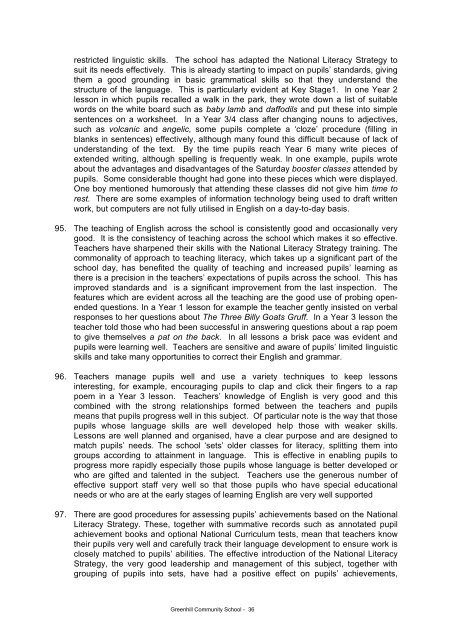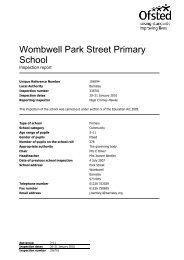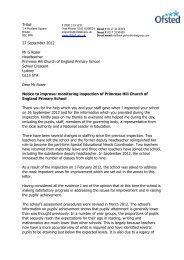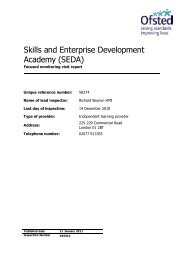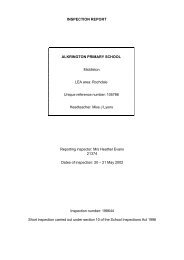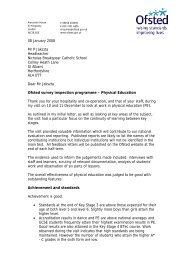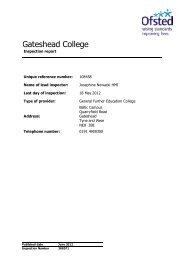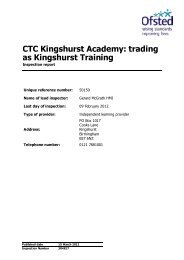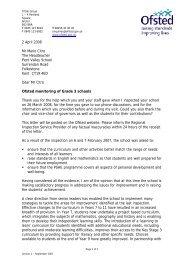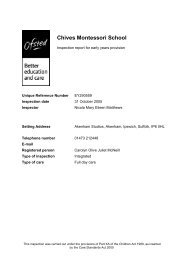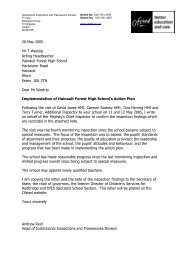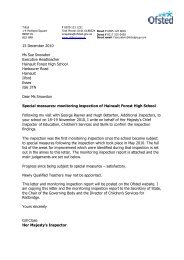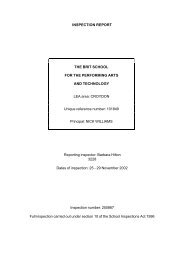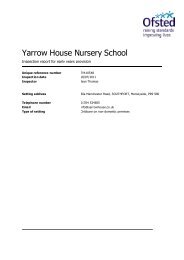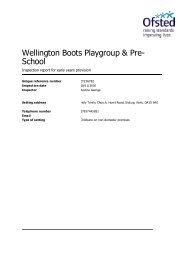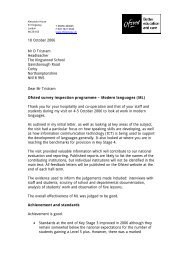pdf School inspection report - Ofsted
pdf School inspection report - Ofsted
pdf School inspection report - Ofsted
You also want an ePaper? Increase the reach of your titles
YUMPU automatically turns print PDFs into web optimized ePapers that Google loves.
estricted linguistic skills. The school has adapted the National Literacy Strategy to<br />
suit its needs effectively. This is already starting to impact on pupils’ standards, giving<br />
them a good grounding in basic grammatical skills so that they understand the<br />
structure of the language. This is particularly evident at Key Stage1. In one Year 2<br />
lesson in which pupils recalled a walk in the park, they wrote down a list of suitable<br />
words on the white board such as baby lamb and daffodils and put these into simple<br />
sentences on a worksheet. In a Year 3/4 class after changing nouns to adjectives,<br />
such as volcanic and angelic, some pupils complete a ‘cloze’ procedure (filling in<br />
blanks in sentences) effectively, although many found this difficult because of lack of<br />
understanding of the text. By the time pupils reach Year 6 many write pieces of<br />
extended writing, although spelling is frequently weak. In one example, pupils wrote<br />
about the advantages and disadvantages of the Saturday booster classes attended by<br />
pupils. Some considerable thought had gone into these pieces which were displayed.<br />
One boy mentioned humorously that attending these classes did not give him time to<br />
rest. There are some examples of information technology being used to draft written<br />
work, but computers are not fully utilised in English on a day-to-day basis.<br />
95. The teaching of English across the school is consistently good and occasionally very<br />
good. It is the consistency of teaching across the school which makes it so effective.<br />
Teachers have sharpened their skills with the National Literacy Strategy training. The<br />
commonality of approach to teaching literacy, which takes up a significant part of the<br />
school day, has benefited the quality of teaching and increased pupils’ learning as<br />
there is a precision in the teachers’ expectations of pupils across the school. This has<br />
improved standards and is a significant improvement from the last <strong>inspection</strong>. The<br />
features which are evident across all the teaching are the good use of probing openended<br />
questions. In a Year 1 lesson for example the teacher gently insisted on verbal<br />
responses to her questions about The Three Billy Goats Gruff. In a Year 3 lesson the<br />
teacher told those who had been successful in answering questions about a rap poem<br />
to give themselves a pat on the back. In all lessons a brisk pace was evident and<br />
pupils were learning well. Teachers are sensitive and aware of pupils’ limited linguistic<br />
skills and take many opportunities to correct their English and grammar.<br />
96. Teachers manage pupils well and use a variety techniques to keep lessons<br />
interesting, for example, encouraging pupils to clap and click their fingers to a rap<br />
poem in a Year 3 lesson. Teachers’ knowledge of English is very good and this<br />
combined with the strong relationships formed between the teachers and pupils<br />
means that pupils progress well in this subject. Of particular note is the way that those<br />
pupils whose language skills are well developed help those with weaker skills.<br />
Lessons are well planned and organised, have a clear purpose and are designed to<br />
match pupils’ needs. The school ‘sets’ older classes for literacy, splitting them into<br />
groups according to attainment in language. This is effective in enabling pupils to<br />
progress more rapidly especially those pupils whose language is better developed or<br />
who are gifted and talented in the subject. Teachers use the generous number of<br />
effective support staff very well so that those pupils who have special educational<br />
needs or who are at the early stages of learning English are very well supported<br />
97. There are good procedures for assessing pupils’ achievements based on the National<br />
Literacy Strategy. These, together with summative records such as annotated pupil<br />
achievement books and optional National Curriculum tests, mean that teachers know<br />
their pupils very well and carefully track their language development to ensure work is<br />
closely matched to pupils’ abilities. The effective introduction of the National Literacy<br />
Strategy, the very good leadership and management of this subject, together with<br />
grouping of pupils into sets, have had a positive effect on pupils’ achievements,<br />
Greenhill Community <strong>School</strong> - 36


